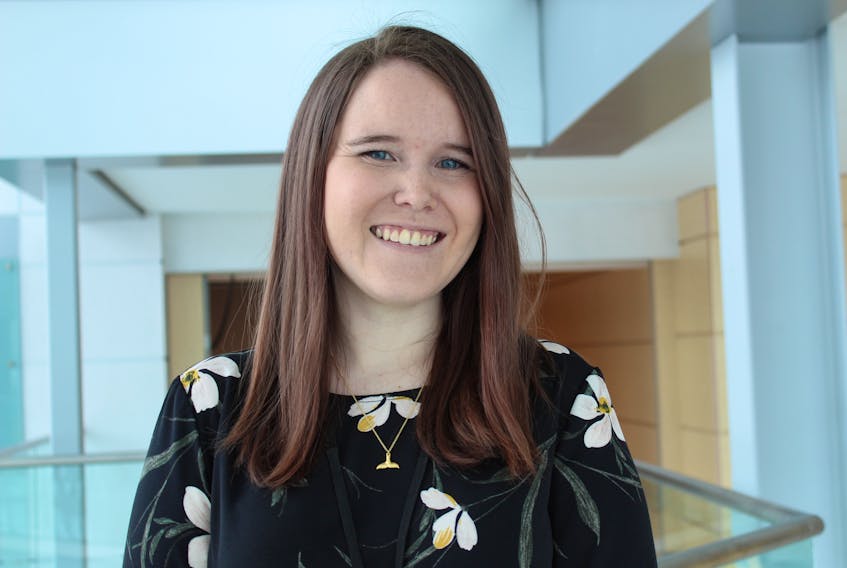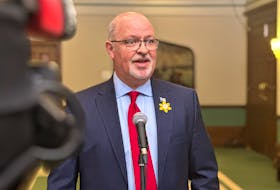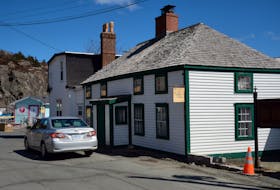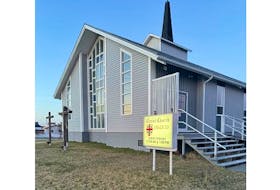ST. JOHN'S, N.L. —

History can help us better understand who we are today. But what happens when there are few historical records from which to learn?
For the transgender community in this province, that’s a reality.
“In Newfoundland, trans histories really haven’t been archived. So, right now — in 2019 — the community really doesn’t have a sense of a past at all,” said transgender woman Daze Jefferies in an interview with The Telegram.
“While we live in the present, it’s a queer temporality of not really knowing where you come from, and by extension, not really knowing where to go in the future.”
Jefferies, 24, was one of many speakers at Memorial University’s Graduate English Student Society’s (GESS) first annual conference at the Bruneau Centre this weekend.
The conference’s inaugural theme was “Identity”. The first segment focused on gender and sexuality in Newfoundland.
GESS executive member Natalie Keith said the topic of identity is particularly timely due to a growing societal awareness of gender and sexual identity.
“That’s something that’s fairly new that hasn’t been a big topic of conversation even within the last 20 years,” she said.
“People are much more aware of each other’s identities and there’s more of a consciousness to make sure you don’t misgender people and misidentify people, and just that awareness of asking someone how they identify instead of imposing an identity on them.”
Despite being an English conference, panellists of various academic backgrounds presented during the two-day event.
Jefferies is a graduate student in gender studies at Memorial and was one of the first presenters. She’s studying the province’s recorded trans history to piece together what she calls the “fishy fragments” of trans women’s lives here.
So far, the earliest mention of a trans woman Jefferies found is in an article published in 1974.
Titled, “Sexual and Other Abnormalities in the Family of a Transsexual”, it was published in the journal Psychiatria clinica by doctors at Memorial University’s School of Medicine and the old General Hospital, Dr. Julius Hoenig and Dr. Elaine Duggan.
A 17-year-old transsexual girl is described in the article using male pronouns.
“The patient’s present interests are in painting, poetry and in hair styling. His ambition is to study at a school of art,” reads one section.
Another paragraph in the article discusses how “the patient” was sometimes mistaken for a girl because “his habits and gestures are more feminine than masculine.”
The article states the teen “has never been sexually attracted to a female”.
“He feels shy in the presence of men and boys and often blushes in their company. Men have often tried to befriend the patient, assuming that he is female. However, when they realize he is a boy, they reject him. As a result, the patient is frustrated, insecure and feels an outcast.”
The same year the article was published was also the year that gay and lesbian activism became formally organized in the province with the founding of the Community Homophile Association of Newfoundland.
“This year — 1974 — is pivotal for some reason across the board of gender and sexual diversity in the province,” Jefferies told The Telegram.
“Before that, we have no public visibility or representation or media — anything before then is just kept in the closet, it’s swept under the rug. It’s also a history of suicide, it’s a history of loss, it’s a history of people not knowing where their community is.”
Jefferies said the little she has found is significant because she shouldn’t have been able to find it at all given how “snuffed out” trans lives have been in the province’s history.
She recalls four years ago asking elder gay community members about trans elders in the province but no one could tell her where to turn.
“I didn’t understand this at the time, but in these past four years I’ve considered how much privacy has been important to trans people historically here, and how much living in stealth has been important as well.
“In many ways, the history is complicated here because people have had to survive, people have not wanted to be visible, and haven’t wanted to be public – they’ve just wanted to survive. So, I also have to understand that and be at peace with that as well because the political climate of trans activism in the city that has really taken off since 2012 – that political climate is very different from 1999, or from 1974.”
Jefferies said there’s been little critical research and writing done on gender and sexual diversity in the province, but today there is a growing community of scholars who want to do the work.
“We want to make this a better place for other trans people,” she said.
Ideally, Jefferies hopes to enable future students more ready access to trans history in the province than what she’s been able to find. Her long-term goal is to help create a tangible resource that anyone can access.
Jefferies has already had conversations with archivists at the university about organizing information about some of the “hidden histories.”
“I’m positioned as one of the only open and visible trans scholars at MUN, and for me this isn’t just my research but it’s also my life. I wake up and I live these questions. So, for me, trying to make a change — an historical change, an archival change, is significant because it gives people a record, it gives people a hope, and it gives people a sense of belonging.”
Twitter: @juanitamercer_









